Muscle-Growth Mistakes | Chest Mistakes | Shoulder Mistakes | Biceps Mistakes
Google ”shoulder training mistakes,” and the search engine will spit out articles featuring advise like ”Don’t use bad form,” ”Move a full range of motion,” and ”Never go too heavy.”
Well…duh! You won’t find that kind of overgeneralized silliness here. This is advice by lifters, for lifters, learned the hard way so you don’t have to. Let’s make someone else’s shoulder pain into your gain—and better workouts.
Mistake 1: Not Leading with Your Elbow on Lateral Raises
Some lifters complain about lateral raises hurting their shoulder, but this can actually be a top-notch move for both shoulder health and gains—if you do it right.
A big no-no: Keeping the elbow low and raising the hand by hinging at the elbow. If you do this, your upper arm doesn’t move through much of the range of motion, and the actual ROM of the muscle is minimal—and so is the benefit.
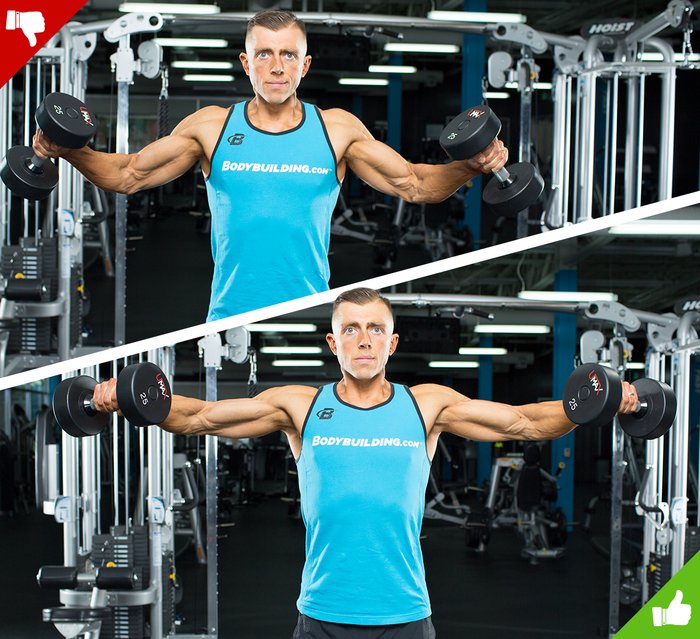
A Better Way: Your hand and elbow should move as a unit on this exercise. Keep your elbow up; your entire forearm should be parallel to the ground at the top.
Mistake 2: Using a Narrow Grip on Upright Rows
Upright rows are another classic lateral delt builder with a bad reputation for aggravating shoulder pain. The difference is all about grip. Using a close grip internally rotates the shoulders, which can contribute to poor posture, shoulder impingement, and rotator-cuff injuries. It also turns the movement into one that focuses squarely on the front delts.
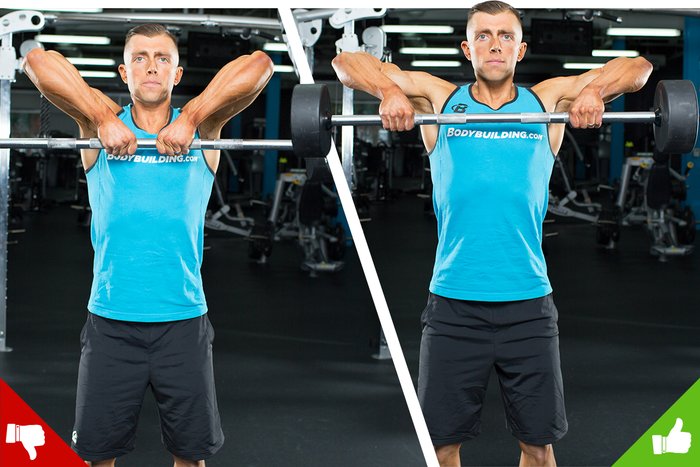
A Better Way: Use a shoulder-width grip to target the side delts, and a wide grip to target the rear delts. If upright rows bug your shoulders, just do raises instead!
Shoulders bugging you? Take care of your joints so you can keep coming back for years to come.
Mistake 3: Turning the Reverse Fly into a Triceps Move
On movements like standing reverse cable flyes, many lifters mistakenly completely extend their elbows at the end of the movement, then bend them as they lower the weights. If you’re extending your elbows on shoulder exercises, congratulations; that sounds like a great triceps exercise. Too bad it’s shoulder day!
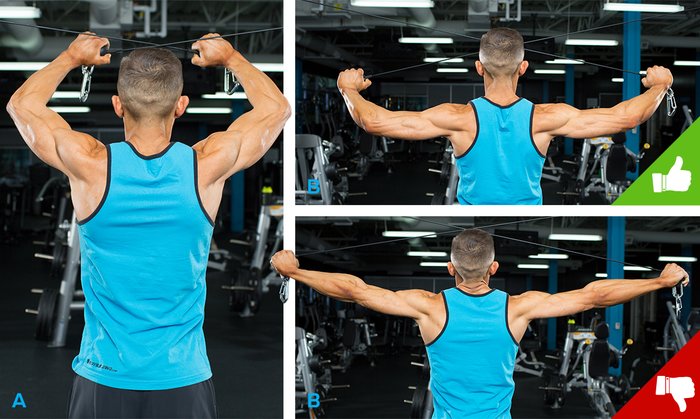
A Better Way: Lock a very slight bend in your elbows and hold it throughout the range of motion. If you’re still having trouble getting it down, do your rear delt work on a pec-deck machine, which better forces you to maintain the proper elbow position throughout.
Mistake 4: Keeping Weights Too Close to Your Body
When you’re doing your single-joint movements for shoulders, like front or lateral raises, shortening the distance the weight is from your body makes the movement easier. You’d do this by keeping a significant bend in your arm. Conversely, if you further extend your arm, it becomes more difficult.
Why would anyone make it easier? Because it allows them to use a heavier weight than they rightfully should, of course. You see where this is headed.
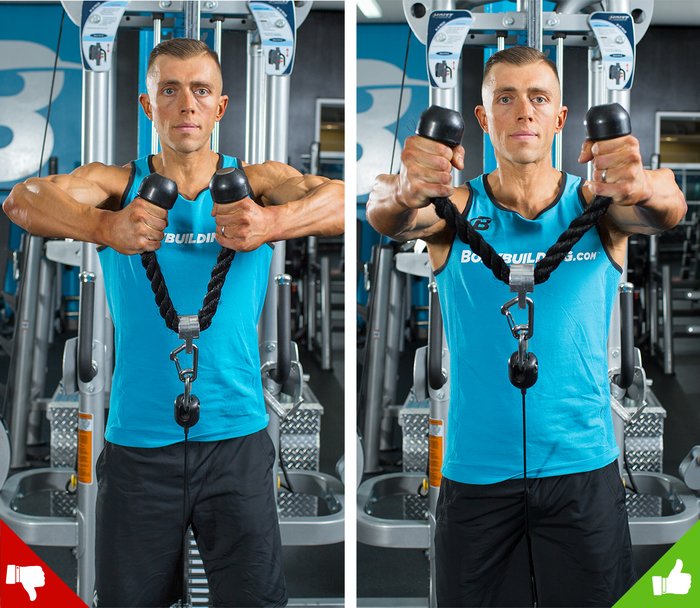
A Better Way: Keep a slight bend in your elbows locked for the duration of the set to maximally tax your front delts. If that makes it hard to hit your reps, use lighter weight!
Mistake 5: Going Heavy on Behind-the-Head Presses
The barbell overhead press is a time-tested shoulder-builder that comes with a few worthy variations: seated or standing, in front or behind your head.
However, not all of these variations are worthy when done with heavy weights! In the bottom position with the barbell behind your head, the shoulder muscles are in their weakest anatomical position, and going heavy significantly increases the risk of an injury. Too many lifters have learned this one the hard way!
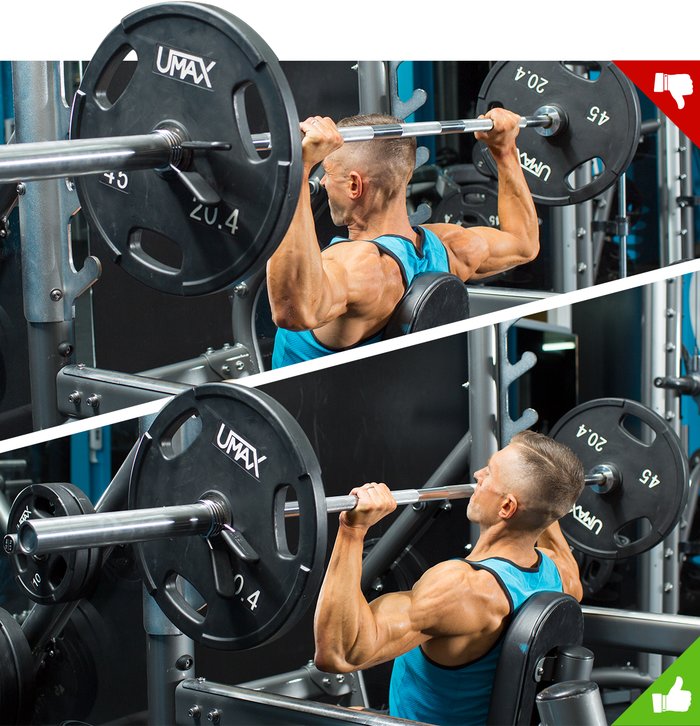
A Better Way: Use only light to moderate weights when going behind the head. And if your shoulders don’t like the move at all, don’t do it!
Mistake 6: Rolling Your Shoulders When Shrugging
The upper traps are best worked when you shrug in a straight up-and-down plane. Why? Because the muscle shortens optimally in only a single direction: up. But if you watch many aspiring meatheads shrug, you’ll see their shoulders rolling or rotating throughout the move. This is ineffective at best and dangerous at worse.
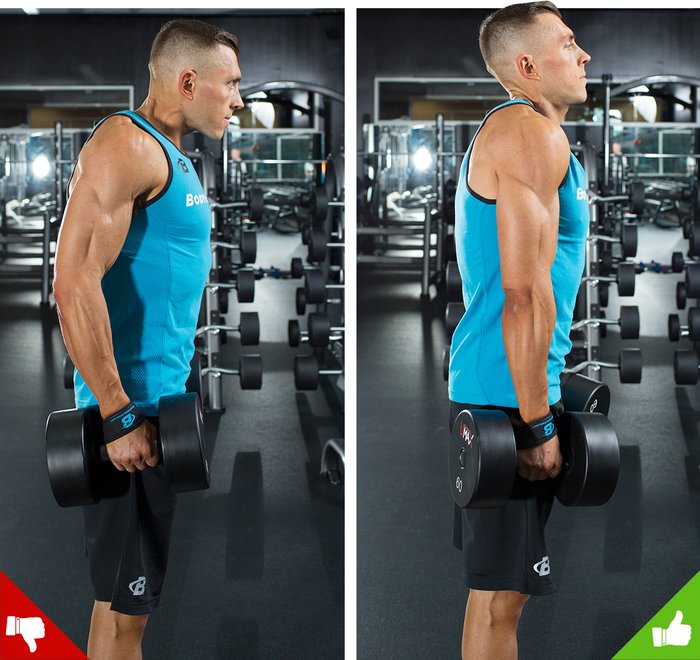
A Better Way: Keep your shrugs strict! Up, pause, down, stretch, repeat.
Mistake 7: Dropping Your Head on Heavy Shrugs
When shrugging heavy during a trap workout, there’s a natural tendency to tilt your head down. Everyone does it! But it’s putting lots of stress on the discs in the cervical region—a lesson I personally learned the hard way, through a neck injury that took years to heal.
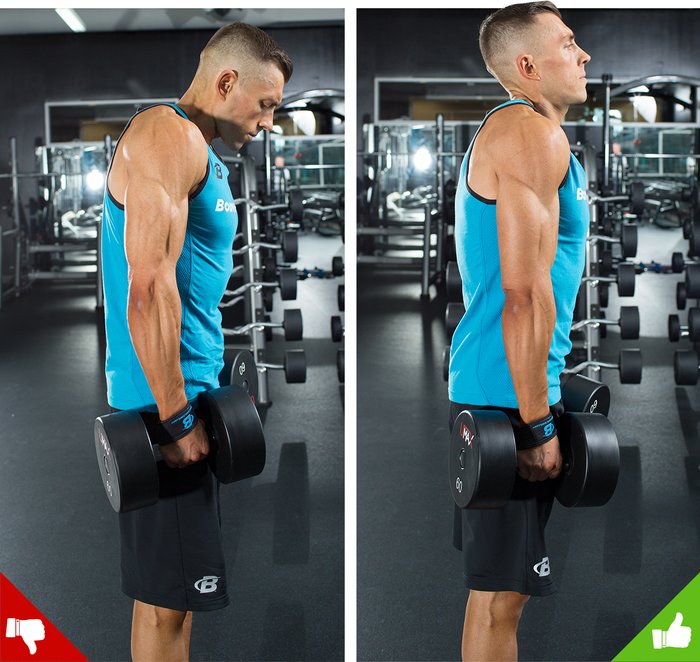
A Better Way: Always look straight ahead. It’s helpful to use a mirror to remind you. Resist all tendency to turn your head downward!
Mistake 8: Waving a Dumbbell on Rotator-Cuff Movements
All too often, I see folks in the gym stand upright while planting an elbow into their side, forearm parallel to the floor and dumbbell in hand. By doing this old-school bench-press warm-up, they think they’re warming up the rotator cuff, a group of four small shoulder-stabilizing muscles. What they’re actually doing is an isometric biceps exercise. Sorry, bro!

A Better Way: Use cables or exercise bands to load the movement horizontally. Or better yet, do John Rusin’s upper-body warm-up from Unstoppable: The Ultimate Guide to Training Through Injury to build strong, stable shoulders that are up for any challenge.
